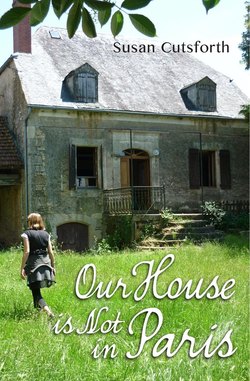Читать книгу Our House is Not in Paris - Susan Cutsforth - Страница 17
На сайте Литреса книга снята с продажи.
The Essence of Cuzance
ОглавлениеSo many elements of our ‘story’ are just that: a story. Meeting Jean-Claude meant that he had become not only our friend but also our guide and mentor. The three of us went on walks around the village. In just a few short promenades with him as our tour guide, our petite village turned out to be a set for an Agatha Christie. There was no way we would have discovered that the wife in one particular house tried to poison her husband — and Jean-Claude assured us he knew this in good faith, as a gendarme had told him. Or that Estelle Loomis, a wealthy elderly lady who owns lots of properties, huddles in her fireplace to keep warm in winter.
I had heard about Anne Barnes, who would have been our next-door neighbour, before we went to our house. Kim and I had entered into an email relationship after Stuart met her and bought our petite maison. Shortly after he returned, Kim told me that Anne, who had worked for the United Nations, had died in the hurricane in Haiti and her funeral was going to be in the village church. So, even before we went to Cuzance, I had a sense of this woman I had never met yet was just a few years older than me and whom, after having heard so much about her, I felt I would have become friends with. When I first met Kim, it was uncanny to be told that I looked similar to Anne Barnes. Then, shortly after meeting Jean-Claude, he told me that he and Françoise had been very good friends with her and he would often help her. It seemed that, in some strange way, we had come into their lives when Anne had gone. The first time we had apéritifs together, they served the rum that Anne had brought them from Haiti every year upon returning to Cuzance. With our new friends, Stuart and I toasted the memory of someone we had not met. And, yet, I had already heard so much about her, I felt I did know her.
I was touched by Anne’s memory and felt tearful. Then one day, as we were working, an agent came to open her house. He invited us to have a look before the prospective buyers arrived. It was a beautiful, large house; the garden by now was sadly overgrown, yet the roses bloomed profusely around the doorway. This time I wept for Anne Barnes — for she always seemed to be referred to by her full name — when I saw her slippers placed side by side next to her bed, and her book, with its bookmark in place, waiting for someone who would never finish it.
Later, Jean-Claude told me about her funeral. Apparently Anne Barnes’ French boyfriend was despised by her sister, and he was forbidden to attend the funeral. He organised his own service for her in the village, ran into the church and seized the ashes. I don’t know the rest of the story but this moved me very much and was yet another example of how Jean-Claude provided us with glimpses into the lives of those around us in the village.
There have been so many occasions when, at home in Australia, we reflect on how very different our experience would be without the friendship of Jean-Claude and Françoise. One early evening, Françoise appeared to inspect our progress after hearing Jean-Claude’s daily reports about our frenetic activity. She took one look at me and was horrified to see how tired I looked. When she asked what we had been having for dinner, I had to confess that it was often only pain. This horrified her even further and so, there and then, we were again whisked away to the comfort of their home and a delicious dîner.
It is all very strange for us — but utterly wonderful — to think that we were in the very privileged position of having another life on the other side of the world.
